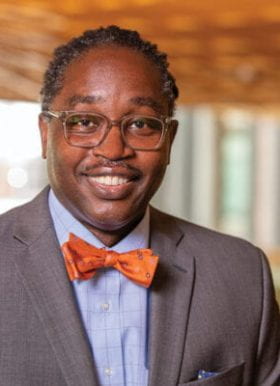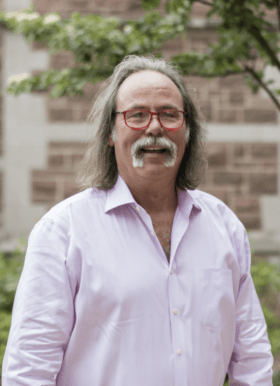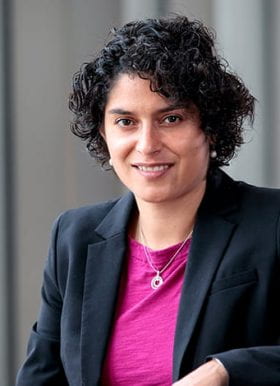
The application cycle is currently closed and will re-open in the Spring 2025.
The Center for the Study of Race, Ethnicity & Equity invites proposals for projects related to the advancement of the CRE2 research mission and the 2020-2024 CRE2 Programmatic Themes. CRE2 will award Seed Grants of up to $15,000 per grant project. The principal aim of this program is to assist in the development of research ideas (e.g. preliminary analyses, pilot studies, conceptual schemas, archival work, etc.) that have the potential to significantly enhance scientific and cultural methodologies and to garner external research support. Priority will be given to research projects that include the following criteria:
- Facilitate multidisciplinary research linkages and establish collaborative research partnerships across campuses and academic/research units, or with local, national and international organizations and agencies
- Include early career faculty or “new” investigators (those who have not previously obtained external funding) as principal or co-principal investigators
- Support undergraduate or graduate assistance in the completion of research activities
- Focus on areas of critical interest to CRE2, the campus, and St. Louis community
- Have not previously received CRE2 grant support, with the exception of Small Grants
To amplify research, the Center for the Study of Race, Ethnicity & Equity has partnered with the Weidenbaum Center on the Economy, Government, and Public Policy to expand the impact of research seed grants.
Only CRE2 Faculty Affiliates are eligible to apply for grants under this program. Eligibility is limited to one CRE2 grant program per year as principal investigator, with the exception of the Small Grants program.
The submission cycle for Seed Grants is currently closed.
Project award periods are for 12 months beginning July 1, 2024, with an extension of up to 6 months available upon grantee request and approval from CRE2 leadership.
Proposals must include an Abstract and the following sections: Overview/Aims (200 words); Significance and Innovation (200 words); Project Description (800 words); Timeline; Budget and Budget Rationale; current CVs for all investigators; and (if applicable) references, description of any human subjects, and appendices.
The Project Description section should (1) describe how the work supported by the Seed Grant relates to the scope of a project proposal that will be submitted for extramural funding, and how the Seed Grant funding will lead to increased competitiveness in obtaining those funds; and (2) include subsections on Foundational Perspectives, Research Questions/Inspiration, Methods, and Data/Materials.
All Seed Grant research proposals that are approved for funding and involve the use of human subjects must obtain appropriate human subjects approval through the University’s Institutional Review Board before funds are disbursed.
Project budgets may request up to $15,000 in direct costs to support any activity that directly relates to the successful conduct of the project. There are no indirect costs paid on CRE2 Grants. Budget items may include support for data entry, interviews, data acquisition, access to restricted-use data, travel costs related to data collection or meetings with collaborators, space rental, salary compensation or contribution to research accounts (salary and compensation should be kept to less than 20% of the award amount), artist stipends, creative materials, curatorial support, editing, and graduate and undergraduate research assistance. The Center will not pay for computer equipment when that computing can reasonably be accomplished with the existing equipment on campus. Unspent funding at the end of the project period will revert to the CRE2 Grant pool unless a request for a time extension is submitted and CRE2 Leadership Team approve the request. Budget Rationales should include outside resources (if any) that will be used to achieve the aims of the project.
To amplify research, the Center for the Study of Race, Ethnicity & Equity is partnering with the Weidenbaum Center on the Economy, Government, and Public Policy to expand the impact of research seed grants.
Weidenbuam Center on the economy, governemnt, and public policy
The Weidenbaum Center is a research institute at Washington University in St. Louis that supports social scientific research in the fields of economics, political science, and sociology. The Weidenbaum Center funds faculty research, provides administrative support for research activities, and sponsors a wide range of public affairs programs. The Weidenbaum Center serves as a bridge between scholars, policymakers, and the general public. Through scientific research and events informed by rigorous scholarship, the Weidenbaum Center addresses many of the pressing issues facing America and the world today.
Seed Grant proposals that seek funding for a social science research project and include a PI or Co-PI in economics, political science, and/or sociology1, may apply for matching funds of up to $15,000, increasing the total seed grant award to up to $30,000.
To apply for matching funds please include an additional Weidenbaum Matching Funds Budget and Weidenbaum Matching Funds Budget Rationale. Projects proposing matching funds will also be reviewed by the Weidenbaum leadership team.
1. The PI or Co-PI must have an appointment in the department of Economics, Political Science, or Sociology to be eligible for these matching funds.
The CRE2 Leadership Team will screen all submitted proposals to determine whether the proposals meet the program’s goals. Proposals will be reviewed by a Grant Selection Committee. In addition to the preferences mentioned above, the following prioritized criteria will be used in evaluating the proposals:
- The overall quality and significance of the proposed research
- The potential of the proposed research to be expanded into an externally funded grant
- The proposed research has received a favorable review from a funding agency and needs additional resources for resubmission (please include Summary Statement with reviewer comments)
The Center will monitor progress on Seed Grant projects. Grantees will provide an expense report upon request. Grantees will submit a final progress report including any grant proposals, publications, exhibitions, or other scholarly products submitted or in preparation within one (1) month after the end date of their Seed Grant period and will notify CRE2 of any proposals, exhibitions, and other scholarly products subsequently submitted or awarded/accepted. It is expected that an external grant proposal will be submitted no later than eight (8) months from the completion of the Seed Grant period. Grantees’ papers and publications will acknowledge the CRE2 Seed Grant program using the statement, “This work has been funded by the Center for the Study of Race, Ethnicity & Equity at Washington University in St. Louis Seed Grant program, but the views remain those of the authors.”
Addressing Environmental Triggers for Youth with High-Risk Asthma: A Pilot Study
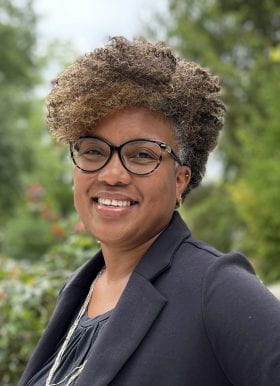
Kelly Harris
Assistant Professor, School of Medicine/Occupational Therapy
- Email: kmharris@nospam.wustl.edu
Chronic disease
Community
Education
Environment injustice
Health equity
Implementation science
Opportunity
Structural racism
This project addresses asthma, the most common chronic condition among youth in the U.S., which disproportionately affects Black children and those living in poverty. Asthma complications—such as sleep disturbances, cognitive impairments, increased stress, and reduced school engagement—are worsened by household environmental triggers like mold, dust mites, and poor-quality HVAC equipment. The Asthma Home Environmental Assessment (Asthma HOME) program includes a Medicaid-approved assessment, a trigger mitigation plan, and implementation strategies to address these triggers. The study aims to refine the Asthma HOME conceptual model through a systematic review and to pilot program components to evaluate their feasibility and effectiveness. By utilizing occupational therapists to address environmental factors in home settings, the project seeks to reduce asthma disparities and improve health equity. Ultimately, the project aims to reduce healthcare costs and improve health outcomes for high-risk youth, demonstrating its potential as a scalable public health intervention.
Moving Stories
Multiplier: The Weidenbaum Center on the Economy, Government, and Public Policy
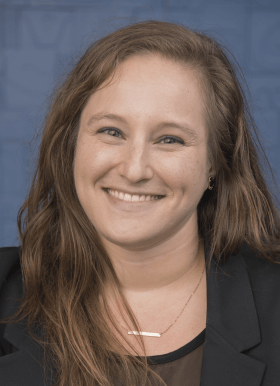
Ariela Schachter
Associate Professor of Sociology
- Email: ariela@nospam.wustl.edu
Computational Methods, Experiments, Immigration to the United States, Neighborhoods, Racial/Ethnic Relations
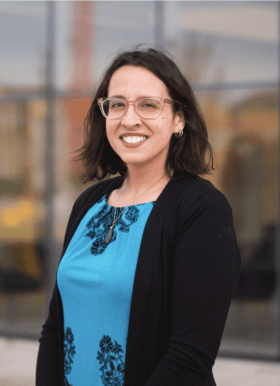
Ila Sheren
Associate Professor of Art History & Archaeology
- Email: isheren@nospam.wustl.edu
Border Studies, Contemporary Art, Environmental Justice, Latinx Studies, Migration
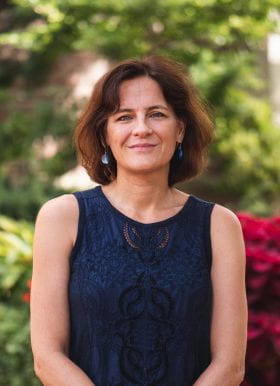
Tabea Linhard
Professor of Romance Languages and Literatures
- Email: tlinhard@nospam.wustl.edu
Border Studies
Critical Refugee Studies
Latinx America
Mediterranean Studies
Migration
Postcolonial Theory
This project aims to foster social and economic integration between immigrants and the broader St. Louis community through a web-based app designed to collect, analyze, and share migration narratives from first- and second-generation immigrants. By gathering visual, textual, and oral stories, the initiative seeks to measure the impact of narrative-sharing on both immigrants’ sense of inclusion and non-immigrants’ attitudes towards them. The project will identify common themes in these narratives, assess the effects of sharing one’s story on immigrants’ feelings of belonging, and evaluate how exposure to these narratives influences broader public support for immigrant inclusion. Collaborating with local organizations, the project will create a living archive of migration stories, thereby enhancing immigrant inclusion in St. Louis. This interdisciplinary effort bridges the humanities and social sciences, offering new empirical strategies and scalable tools for reducing prejudice and promoting inclusive policies, ultimately aiming to generate new knowledge and effect social change.
Turn the Page! Illustrating Indian Comics Scenes

Shreyas Krishnan
Assistant Professor, Sam Fox School of Design & Visual Arts
Comics
Visual Culture
Gender
South Asia
“Turn the Page!” is a groundbreaking project that aims to produce the first comprehensive edited monograph on the histories, contexts, and contemporary practices of comics in India. Featuring contributions from over 30 creators, researchers, and academics, the book addresses significant gaps in understanding Indian comics through research articles, non-fiction comics, visual essays, and interviews. It covers comics practice from the 1960s to the present, contextualized within regional histories, visual cultures, and current socio-political realities. The monograph aims to challenge the colonial legacy overshadowing regional comics traditions in India by foregrounding marginalized histories and creators. By integrating diverse academic and creative perspectives, “Turn the Page!” aims to foster a more inclusive and equitable narrative for future scholarship and practice in Indian comics.
TOUCH. HEAL. LOVE.: Black Men’s Health and Well-being
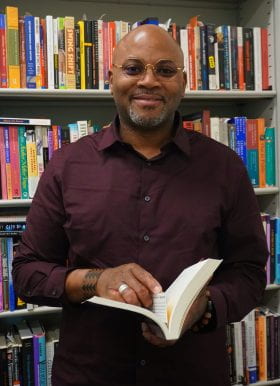
Marlon Bailey
Profesor of African and African American Studies and Women, Gender, and Sexuality Studies
- Email: b.marlon@nospam.wustl.edu
Ballroom Culture
Black LGBT Studies
Black Queer Theory
HIV/AIDS
Intersectionality
Performance
Sexual Health

Keon McGuire
Associate Professor of Higher Education Opportunity, Equity, and Justice, North Carolina State University
This project addresses the social and mental health crisis among Black men and those on the gender spectrum, exacerbated by intersecting forms of oppression such as structural anti-Black racism, heteropatriarchy, homophobia, and transphobia. The project aims to explore how certain expressions of Black masculinities served as barriers to forming meaningful, intimate relationships. Employing Black Feminism and queer of color analysis, the project seeks to redefine Black masculinities to foster deeper, healthier interpersonal connections.
The Impact of an Educational Intervention on Anti-Black Interpersonal Bias Among Medical Students in an Academic Medical Center
Multiplier: Institute for Public Health
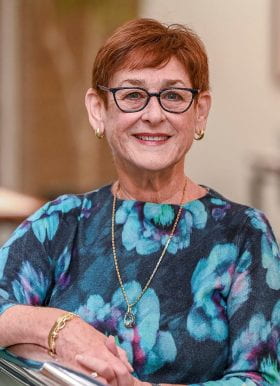
Donna Jeffe
Professor of Medicine, School of Medicine/Department of Medicine
- Email: jeffedonnab@nospam.wustl.edu
Critical Race Theory
Education
Gender
Health Disparities
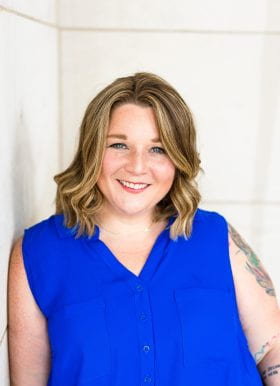
Kaytlin Reedy-Rogier
Director of Health Equity and Justice, Medical School
Anti-Racism Education
Education Interventions
Health Disparities
Health Equity
The project aims to evaluate the efficacy of educational curricula in mitigating interpersonal anti-Black biases among medical students at Washington University School of Medicine (WUSM). Recognizing the role of interpersonal and structural racism in healthcare inequities, WUSM has integrated specific training to foster trauma-informed and structurally competent care.
Perspectives of Black Peer Coaches on the Barriers and Facilitators to Recovery from Opioid Use Disorder and Commonly Occurring Mental Health Disorders
Multiplier: Institute for Public Health
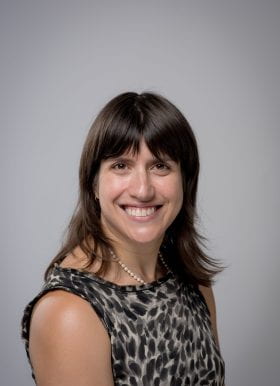
Hannah Szlyk
Instructor Research Faculty, School of Medicine, Psychiatry
- Email: szlyk@nospam.wustl.edu
Health equity
Interventions
Mental health
Mobile health
Public Health Critical Race praxis
Recovery support services
Substance use
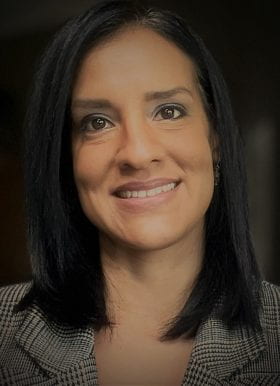
Patricia Cavazos
Professor, Psychiatry
- Email: pcavazos@nospam.wustl.edu
Health disparities
Mental health
Psychiatric disorders
Technology-based interventions
Epidemiology
The research project targets the escalating opioid-related deaths among Black Americans in St. Louis, Missouri, by exploring the integration of mobile health (mHealth) and peer recovery coaching. Focused on addressing social and structural barriers that limited care for Opioid Use Disorder (OUD) combined with common mental health disorders (COMD), the project aimed to: 1) Understand the perspectives of Black peer recovery coaches on recovery services and barriers for Black Americans with OUD and COMD, and 2) Identify facilitators and obstacles to implementing mHealth among these coaches. The significance of this research lay in its innovative approach to combine mHealth with peer recovery coaching, enhancing treatment accessibility and efficacy for Black Americans.
A Pilot Study to Explore the Feasibility and Acceptability of the Fathers First Initiative to Improve Paternal Involvement in Maternal and Infant Health
Multiplier: Institute for Public Health

Jesse Davis
Senior Clinical Advisor for Infant and Maternal Health Initiatives at the BJC Healthcare Office of Community Health Improvement
- Email: jessedavis@nospam.wustl.edu
Infant Mortality Prevention/Disparities, Maternal Health, Implementation Science, Health Equity, Prematurity, Health Economics & Policy, Social Impact

Tyriesa Howell
Assistant Professor, Brown School
Exploring the Engagement of Father Involvement on the Culture of Infant and Maternal Health in NICU Settings
Dr. Davis and Dr. Howell aim to improve infant and maternal health outcomes through enhanced paternal involvement. This study proposes evaluating the impact of mental health support and parenting education designed specifically for fathers to moderate improved infant and maternal health outcomes. Awardees also received matching funds from the Institute of Public Health.
Refugee Success: Developing Refugee-Grounded Definitions and Measurement
Multiplier: Institute for Public Health
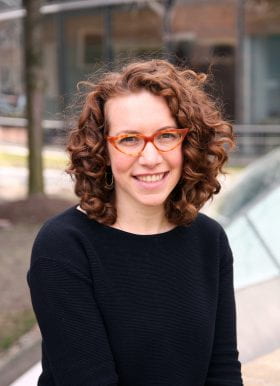
Margot Moinester
Assistant Professor of Sociology
- Email: mmoinester@nospam.wustl.edu
Health, Immigration, Inequality, Law, Policing and Social Control

Ilana Seff
Research Assistant Professor, Brown School
- Email: seff@nospam.wustl.edu
Gender-based violence
Humanitarian settings
Intersectionality
Mental health
Mixed methods
Refugee well-being
Social norms

Lindsay Stark
Associate Dean of Global Programs/Professor, Brown School
Gender norms
Gender-based violence
Global child protection
Psychosocial well-being
Refugees and displaced populations
Violence prevention
Who gets to define- and what predicts- refugees’ success in their new societies? This project shifts scholarly attention towards refugee-centered understandings of success. This research meets three primary objectives: 1. Demonstrate the feasibility of recruiting and engaging refugees and staff from resettlement and civil society organizations in research activities 2. Produce initial insights into refugee-defined conceptions of success 3. Conduct secondary data analysis to ascertain how existing quantitative datasets on refugees conceptualize and measure success and related concepts. The grant supported them in recruiting and conducting 37 in-depth interviews with refugees from Iraq and the Democratic Republic of Congo in St. Louis and Denver. They also conducted seven key informant interviews. The researchers are finalizing a peer-reviewed paper on qualitative findings from interviews, exploring refugee success domains and variations by origin country. They also conducted a scoping review of existing instruments measuring refugee success in the US to compile a comprehensive list. Manuscripts for publication are imminent, with one invited for a special issue.
Migration and Racial Representation in St. Louis County since 1970

Brian Crisp
Professor of Political Science
- Email: crisp@nospam.wustl.edu
Electoral Rules, Representation, Legislatures, School Boards, City Councils

Matthew Gabel
Professor of Political Science
- Email: mgabel@nospam.wustl.edu
Alzheimer Disease, Electoral Politics, Health Disparities, Migration Quantitative Methods, Race and Political Representation, Urban Politics
This grant provided support for a post-doc student for the 2022-23 academic year. Her duties, outlined in the proposal, included coding to extract candidate names and electoral results from historical records of municipal and school board elections in St. Louis County since 1970 and supervising undergraduate research assistants in collecting demographic information about these candidates. The primary objective was to provide preliminary evidence for a National Science Foundation (NSF) proposal. The student also aided in assembling data for the NSF application in January 2023.
African Centered Cultural Socialization Scale for Black Youth: A Preliminary Investigation of Reliability and Criterion Validity
Multiplier: Institute for Public Health
The research project aims to develop a self-report measure of parental cultural socialization messaging among Black youth, with a focus on understanding its relation to development outcomes among young Black males. The primary objective is to address measurement limitations in existing scholarship regarding Afrocentric Socialization and Black youth by creating a reliable self-report measure. The project engages in instrument refinement and psychometric testing, resulting in the creation of the Parental Afrocentric Socialization Scale. This scale demonstrates high reliability and validity, assessing key dimensions such as self-determination, heritage value, faith, and relationships. Findings from the project were published in the Journal of Human Behavior in the Social Environment and are currently under consideration for publication in Cultural Diversity & Ethnic Minority Psychology. Limitations include the need for further investigations into the scale’s psychometric properties and longitudinal studies to explore long-term impacts. Future research aims to diversify samples and examine cultural nuances to enhance the scale’s generalizability and validity across different Black populations.
Is America’s Democracy at Risk? Inter-Racial and Intra-Racial Differences in Support for Democratic Institutions and Processes
Multiplier: The Weidenbaum Center on the Economy, Government, and Public Policy
The project aims to test hypotheses concerning variations in the evaluations and perspectives of African Americans regarding U.S. political and legal institutions, with a specific focus on their willingness to support democratic processes. Conducted through a panel survey in April 2021, the project addresses the lack of extensive study on the attitudes of Black Americans, often due to insufficient representation in surveys. Previous research indicates that Black attitudes towards legal institutions are influenced by factors such as support for democratic values, experiences with legal authorities, and group affiliations. With funding support, the project developed a panel survey comprising nearly 600 representative African American respondents to explore the legitimacy of American political and legal institutions. The main report from the survey can be found in the awardee’s book, “Democracy’s Destruction? The 2020 Election, Trump’s Insurrection, and the Strength of America’s Political Institutions,” set to be published in May 2024. In addition, the book (and by extension the grant) will be the topic of a named, invited lecture at the University of Michigan, “Democracy’s Destruction? The 2020 Election, Trump’s Insurrection, and the Strength of America’s Political Institutions.” Miller Converse Lecture, Center for Political Studies, University of Michigan, March 2024, Ann Arbor, MI.
Characterizing Contextual Change and Its Impact on Health Behaviors, Mental Health, and Quality of Life Among Latin American Immigrants in St. Louis
Multiplier: Institute for Public Health
This mixed-methods research project seeks to investigate the impacts of significant contextual changes on the health behaviors and mental well-being of Latin American immigrants in St. Louis, a region not traditionally recognized as a major immigrant-receiving community. The study focuses on the relationship between these contextual changes and obesity-related behaviors (such as physical activity and diet), mental health outcomes (including depressive and anxiety symptoms), and overall quality of life. Utilizing a socio-ecological approach, the project aimed to 1) develop and pilot test methods for assessing multilevel contextual changes from immigrants’ countries of origin to their new environments, 2) diagnose current health behaviors and mental health status, and 3) engage with the community to inform the development of targeted health interventions. Methodologies include surveys, GIS technologies, and physiological measures such as accelerometers. Outcomes from this study will provide essential data to inform culturally appropriate interventions, strengthen collaborations with Latino-serving organizations, and support a subsequent application for a larger-scale study, aiming to address health disparities among this population.

